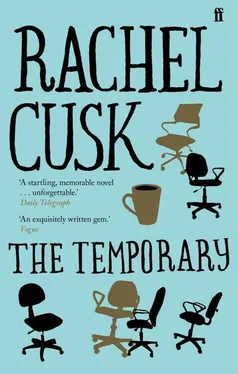Rachel Cusk - The Temporary
Здесь есть возможность читать онлайн «Rachel Cusk - The Temporary» весь текст электронной книги совершенно бесплатно (целиком полную версию без сокращений). В некоторых случаях можно слушать аудио, скачать через торрент в формате fb2 и присутствует краткое содержание. Год выпуска: 2013, Издательство: Faber & Faber, Жанр: Современная проза, на английском языке. Описание произведения, (предисловие) а так же отзывы посетителей доступны на портале библиотеки ЛибКат.
- Название:The Temporary
- Автор:
- Издательство:Faber & Faber
- Жанр:
- Год:2013
- ISBN:нет данных
- Рейтинг книги:5 / 5. Голосов: 1
-
Избранное:Добавить в избранное
- Отзывы:
-
Ваша оценка:
- 100
- 1
- 2
- 3
- 4
- 5
The Temporary: краткое содержание, описание и аннотация
Предлагаем к чтению аннотацию, описание, краткое содержание или предисловие (зависит от того, что написал сам автор книги «The Temporary»). Если вы не нашли необходимую информацию о книге — напишите в комментариях, мы постараемся отыскать её.
The Temporary — читать онлайн бесплатно полную книгу (весь текст) целиком
Ниже представлен текст книги, разбитый по страницам. Система сохранения места последней прочитанной страницы, позволяет с удобством читать онлайн бесплатно книгу «The Temporary», без необходимости каждый раз заново искать на чём Вы остановились. Поставьте закладку, и сможете в любой момент перейти на страницу, на которой закончили чтение.
Интервал:
Закладка:
Once, when he was very young and his parents still lived together in their house — a memory more disappointing than precious, a good beginning made ridiculous by what came later — he had been sitting on the edge of his parents’ bed while his mother ‘lay in’. She often did that at the weekend, her pillows banked behind her, the frill of her nightdress making a doll of her recumbent form, and he had used to think that she suffered from a brief but regular illness which afflicted her only on those particular days, days when he wanted to play and the house to be full of life. Later, when she really did fall ill, the resemblance of her confinement to those mornings made it seem natural to him, a state to which she had always been going to revert. On this particular morning, he had found something on her bedside table, a mysterious plastic contraption like a large straw, with a funnel at one end and a smaller inner cylinder which slid in and out of the larger one.
‘What’s this for?’ he had said, holding it up and trying to make a toy of it by sliding the cylinder in and out.
‘Never you mind‚’ his mother had snapped, reclaiming the object from his curious fingers and putting it in a drawer beside her.
‘But what’s it for ?’ he had insisted. Her censorship had shown him a glimpse of something dark and confidential, and he attempted to work it out himself so that he could present her with the answer.
‘You’ll find out when you’re older,’ his mother had replied; and he had known then that it must be something to do with sex , that unwanted inheritance which promised one day to explain things which now seemed comic and unbelievable. The odd thing was that he hadn’t found out later, when sex was as familiar to him as he feared it was ever going to be. It had haunted him, a missing clue, a cipher for his inadequacies. His failure to encounter it devolved accusatorily back upon him, made worse by the fact that even in his enlightened state he still couldn’t begin to conjure up a use for the silly thing. Then, one evening, he had found one in Belinda’s bathroom, lying nonchalantly on a cluttered shelf among shampoo bottles and jars of face cream. For a moment he had been paralysed by the sight, but the sudden and tangible appearance of the symbol filled him with a heedless determination to decipher it. He took it back with him to the other room and held it before her.
‘What’s this?’ he demanded.
A mild astonishment lifted her features, and even through his agitation he felt a fist of love clench in his chest for the way expressions settled on her face like butterflies.
‘It’s for thrush,’ she said calmly. ‘You put this pill on the end of it, a huge sort of horse pill, and then just shove it up.’ His face must have been entertaining, for she began to laugh as she watched him. ‘Don’t look so horrified,’ she said. ‘You did ask.’
He told her about his mother and saw her amusement become kinder and more genuine. She liked to hear of him as a little boy, and he sometimes feared that her feelings for him found a more natural object in that younger incarnation.
‘What on earth did you think it was?’ she said.
‘An erotic sex toy,’ he admitted gamely, playing the fool. Belinda’s revelation had made him feel quite light headed.
‘But how—?’ She began to shake with laughter, wiping tears from her eyes. ‘Really?’
He sensed a thread of mockery in her voice, and for a moment he didn’t understand how he had changed from an object of sympathy into one of ridicule. A flash of anger tore through him, not at her, but at his mother, for seeing in his young, pliant face a future in which this scene would come to pass. Her failure to save him from it, to make the world easier for him, seemed to constitute evidence of a horrifying neglect, but thinking about it later, he saw in it something far worse, a submission to indignity, the certainty of a terrible homogeneity which made the future as inescapable as the past.
The sense of imprisonment within his own faculties which had haunted Ralph then still plagued him, and lately he had found that the wide and insuperable border which lay between himself and Francine, rather than lending him a prouder definition, had made him feel more than ever sealed up inside himself. In the beginning he had fancifully imagined that their differences might eventually be fertile — she had said so herself, in fact, reading to him from a magazine in that impervious way she had, about the attraction of opposites — but once or twice he had glimpsed himself lost in the bleak open spaces of their conversation and had since abandoned the hopeful examination of their prospects. Had he been going to put a stop to it all and return to the imperfect but comfortable life which only a few weeks ago had been in his grip, that moment when he had diagnosed a fatal sterility in their situation was the time to have done it. Now, however, his senses were no longer vigilant against novelty, and although he had developed no real liking for the element in which he currently lived, custom made it harder to remember Francine’s insinuations and thus extricate himself from them. His early posture, redolent of imminent departure, had disintegrated into an attitude of collapse from which thoughts of change or movement were hazy and reluctant. He was waiting, he supposed, for an outside impulse to direct him towards action, knowing that his own mechanisms had failed and their authority been superseded by that of circumstance. His resolutions visited him like ineffectual salesmen, and although he had often persuaded himself with the memory of his most recent meeting with Francine to draw their history to a halt, the subsequent encounter would invariably demonstrate the intractability of the status quo in the face of his attempts to suborn it.
‘I think I need to spend some time on my own,’ he had even said to her one evening, his heart growing wild in its cage of timidity.
They were sitting in his flat watching television, a habitat in which at first he had been benumbed with sorrowful incredulity, but which was becoming every day more familiar to him. Francine had certain programmes she liked to watch, and their recurring nature formed a schedule from which, he soon found, she could not be derailed. The appearance of such habits had been swift, and the hostility of their tastes meant that their diversions rarely blended to form an impression of mutuality. The depth of Francine’s security in her own preferences, in fact, meant that Ralph’s suggestions of things they might do were often overridden, and he had begun to suspect that her early willingness to investigate his cultural activities was merely ceremonial. She had beaten him at the negotiating table, he had to admit, with the luring inference that she might be willing to change, but having secured his interest the hint of compromise disappeared. His only manoeuvres were those of indifference, and he was surprised to discover how much of it her vanity could withstand.
‘Why?’ she had replied, creasing her forehead in the mildly irritating demonstration of incomprehension she gave him when he said things she didn’t understand. He perceived the reprimand for obtuseness contained within this expression, and knew that she really didn’t see what he meant. Her face told him that he would have to be much clearer, clearer than perhaps he could be and certainly more cruel, if he wanted to make himself understood.
‘Why do you want to be on your own?’ she repeated.
He realized that she merely considered him boring, a consideration which possibly troubled her as much as his own misgivings. The spirit of reform had left him after that, and Ralph began to wonder if the problem was really his own. The way in which Francine presented herself to him as if with the expectation that he would manufacture substance, would perform tricks like a man sawing at a spangled woman in a box, cultivated in him the suspicion that what he was witnessing was merely the spectacle of his own inadequacies. Through her he saw the lives of strangers, heard their footsteps echo through the halls of her heart, watched their ghosts slip inadvertently from her lips as she mentioned them, the advertising executive with the sports car, the local nightclub owner, the married manager, even the geography teacher at school, for Heaven’s sake; these men whose keys had fitted the mysterious lock with which Ralph daily wrestled, amongst whose furnishings he was expected to make himself at home, these dreadful characters whom he could not but feel it was ordained for him never to encounter, suddenly sharing with him the most galling intimacy! They hung about him like an ill-fitting second-hand coat, a dark path around the collar, pouches at the elbows, a roll of old mints discovered in a pocket. He was repelled by their proximity. He had loathed Belinda’s old boyfriends too, of course, but in a more brotherly manner: they were more perfect versions of himself, with whom nevertheless he felt a certain kinship, a loose matching of identities which left his essence undisturbed while jealously could torment his surface. His relation to Francine’s redundant men was altogether more troubling, for he could not see what it was that united them. They made a shiftless, uncomfortable group, a band of brigands amongst whom one had to watch one’s back, their common principle not love, but weakness.
Читать дальшеИнтервал:
Закладка:
Похожие книги на «The Temporary»
Представляем Вашему вниманию похожие книги на «The Temporary» списком для выбора. Мы отобрали схожую по названию и смыслу литературу в надежде предоставить читателям больше вариантов отыскать новые, интересные, ещё непрочитанные произведения.
Обсуждение, отзывы о книге «The Temporary» и просто собственные мнения читателей. Оставьте ваши комментарии, напишите, что Вы думаете о произведении, его смысле или главных героях. Укажите что конкретно понравилось, а что нет, и почему Вы так считаете.












